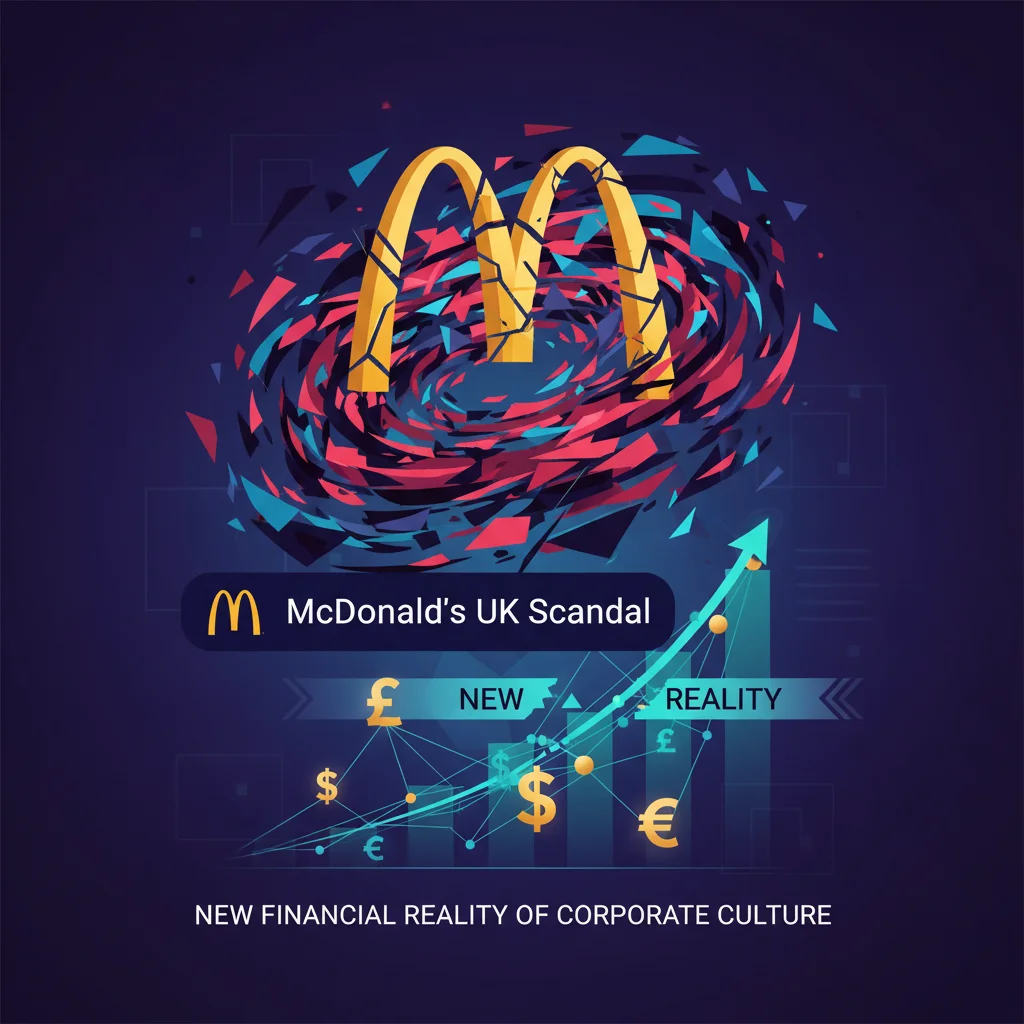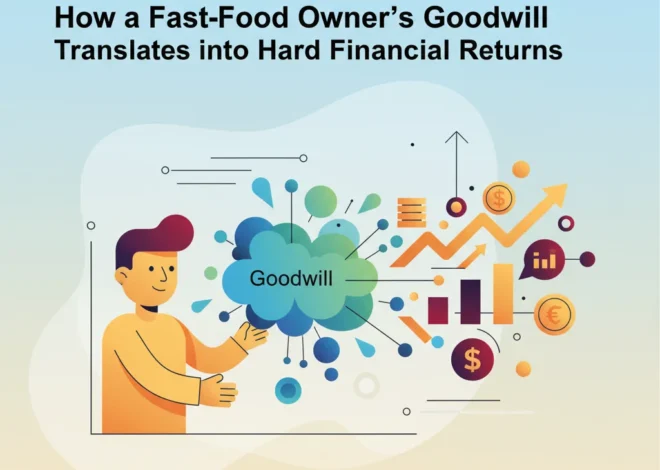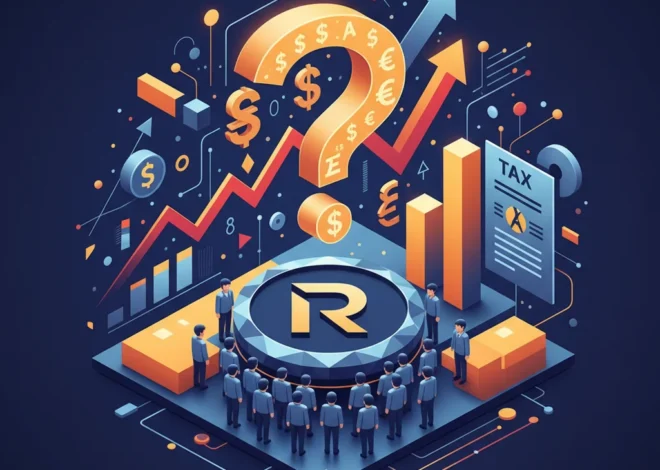
Beyond the Golden Arches: McDonald’s UK Scandal and the New Financial Reality of Corporate Culture
In the world of high-stakes finance and investing, corporate risk is traditionally measured in terms of market volatility, credit defaults, and liquidity crunches. However, a seismic shift is underway, and its epicenter is not on the trading floor but in the break rooms and kitchens of global corporations. The recent headlines surrounding McDonald’s in the United Kingdom serve as a powerful and cautionary case study. The fast-food giant has entered into a legally binding agreement with Britain’s Equality and Human Rights Commission (EHRC) to overhaul its procedures for handling sexual harassment, a move prompted by a damning BBC investigation that uncovered over 100 allegations of a toxic work environment.
While the human cost of such failures is paramount, for investors, business leaders, and financial professionals, this story resonates on a different, yet equally critical, frequency. It underscores a new reality in the global economy: a company’s internal culture is no longer a “soft” HR issue but a hard, quantifiable financial risk. A failure in corporate governance, particularly in the “Social” pillar of ESG (Environmental, Social, and Governance) criteria, can directly erode shareholder value, damage brand equity, and create significant legal and operational liabilities.
This is not merely about one company’s missteps; it’s a reflection of how the very calculus of corporate valuation is evolving. Let’s dissect the McDonald’s situation and explore its profound implications for the modern financial landscape.
The Anatomy of a Reputational Crisis
The core of the issue stems from serious and widespread allegations of sexual assault, harassment, racism, and homophobia within McDonald’s UK restaurants. The BBC’s investigation painted a grim picture of a workplace culture where young staff members, in particular, felt unsafe and unsupported. In response to these revelations and the subsequent pressure, the EHRC, a statutory non-departmental public body, stepped in.
Under the terms of the legal agreement, McDonald’s UK has committed to a comprehensive action plan. This includes:
- Communicating a zero-tolerance policy on sexual harassment.
- Conducting anonymous surveys to gauge workplace safety.
- Enhancing policies and procedures to prevent and respond to harassment.
- Implementing specific training for managers to identify and handle protected characteristics and employee complaints.
Alandra Gress, the Chief Executive of McDonald’s UK & Ireland, acknowledged the failings, stating, “we have fallen short, and for that we are deeply sorry.” This public admission and legally binding commitment highlight the severity of the situation. For a brand built on family-friendly imagery and standardized efficiency, such a fundamental breakdown in employee safety is a direct threat to its core identity.
UK's £420M Lifeline for Heavy Industry: A Strategic Investment or a Drop in the Ocean?
From HR Issue to Balance Sheet Liability: Quantifying the Risk
For a business leader or an analyst monitoring the stock market, the immediate question is: “What’s the financial fallout?” The costs associated with a systemic cultural failure are multifaceted and can cascade through an organization’s financial statements. It’s crucial to move beyond the headline and analyze the tangible and intangible costs.
Here is a breakdown of the key risk categories that a crisis like this activates:
| Risk Category | Specific Manifestation | Impact on Stakeholders |
|---|---|---|
| Financial Risk | Legal fees, potential fines from regulators (like the EHRC), settlement payouts to victims, cost of implementing new training programs nationwide. | Direct impact on profitability and reduced returns for investors. |
| Operational Risk | Increased employee turnover, difficulty in recruitment, decreased productivity and morale, management time diverted to crisis management instead of growth initiatives. | Disrupts service consistency, increases operational costs (hiring, training), and affects employees’ well-being. |
| Reputational Risk | Negative press coverage, erosion of brand trust, potential consumer boycotts, damage to employer brand. | Reduces customer loyalty and makes it harder to attract top talent, impacting long-term growth. |
| Market Risk | Negative sentiment among investors, potential downgrades from ESG rating agencies, stock price volatility. | Can trigger sell-offs by institutional funds with strict ESG mandates, directly impacting shareholder value. |
The cost of high employee turnover alone can be staggering. According to a Gallup report, the cost of replacing an individual employee can range from one-half to two times the employee’s annual salary. For a company with the scale of McDonald’s, which employs over 150,000 people in the UK, even a marginal increase in turnover due to a poor work environment represents a multi-million-pound liability.
The ESG Imperative: Why the Modern Investor Cares
The rise of ESG investing has transformed the landscape. It’s no longer a niche strategy but a core component of portfolio management for major institutional investors, pension funds, and banking institutions. These investors understand that companies with strong ESG performance often exhibit better operational efficiency, lower risk, and more sustainable long-term growth.
A scandal centered on employee welfare directly attacks the ‘Social’ pillar. ESG rating agencies like MSCI and Sustainalytics will undoubtedly factor this into their scoring of McDonald’s. A downgrade can have severe consequences:
- Exclusion from Funds: Many ESG-focused exchange-traded funds (ETFs) and mutual funds have strict mandates that would force them to sell their holdings in a company that fails to meet certain social criteria.
- Increased Cost of Capital: A lower ESG score can be perceived as higher risk, potentially leading to less favorable terms from lenders and a higher cost of capital.
- Shareholder Activism: The incident provides powerful ammunition for activist investors to demand changes at the board level, pushing for greater oversight and accountability.
This new paradigm forces corporate boards to view investment in culture, training, and employee well-being not as an expense, but as a crucial investment in risk mitigation and long-term value preservation. The financial markets are increasingly punishing companies that fail to grasp this reality.
The Hidden Capital in Your Utility Bill: Unlocking Dormant Assets in a Digital Economy
Can Technology Provide a Path Forward?
As corporations grapple with these challenges, many are looking towards technology for more robust solutions. While the core of the solution lies in human leadership and cultural change, technology can play a vital supporting role in ensuring transparency and accountability.
The world of financial technology (fintech), which has revolutionized payments and lending, is now inspiring a new wave of ‘RegTech’ (Regulatory Technology) and ‘HR Tech’. These platforms can help large organizations manage compliance and reporting on a massive scale. For instance, sophisticated systems can track the completion of mandatory training, manage incident reports with clear audit trails, and use anonymized data to identify systemic issues before they escalate into a full-blown crisis.
Looking further ahead, some futurists even speculate about the role of technologies like blockchain. A blockchain-based system could, in theory, create an immutable, tamper-proof record of compliance activities—such as harassment training completion or the handling of an internal complaint. This would provide regulators and auditors with an unprecedented level of transparency, making it much harder for systemic failures to be swept under the rug. While still a nascent concept in HR, the underlying principles of transparency and verifiability that drive blockchain in finance are directly applicable to solving problems of corporate governance.
The Broader Economic Shockwaves
The significance of this event extends beyond McDonald’s. As one of the world’s largest employers, particularly of young and first-time workers, its labor practices set a precedent for the entire service sector. A failure to provide a safe working environment has ripple effects throughout the economy. It can discourage labor force participation, normalize poor management practices, and erode public trust in corporations.
Conversely, a successful and transparent turnaround can set a new, higher standard for the industry. It signals to the market that investing in a safe and respectful culture is not only an ethical obligation but also a sound business strategy. This shift is part of a larger movement towards stakeholder capitalism, where companies are judged not just on the profits they deliver to shareholders, but on the value they create for all stakeholders—employees, customers, and society at large.
Mastering Your Financial Future: Four Pillars of Modern Money Management
Conclusion: The New Bottom Line
The McDonald’s UK harassment scandal is far more than a corporate PR crisis. It is a stark reminder that in the 21st-century economy, the line between corporate culture and financial performance has been erased. For business leaders, the lesson is clear: cultivate a culture of respect and safety, or risk paying a steep price in the form of legal battles, brand degradation, and investor flight. For those in the world of investing and finance, it’s a call to look beyond traditional metrics and integrate a sophisticated understanding of social governance into every analysis. The most valuable asset on any company’s balance sheet is its people, and the markets are finally, and forcefully, beginning to price it in.


